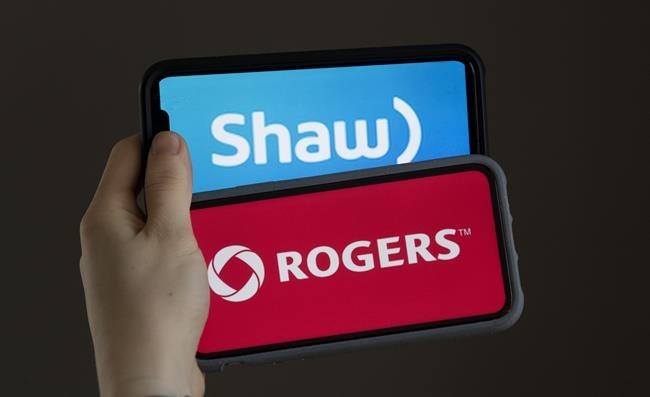TORONTO — A planned takeover of Shaw Communications' Freedom Mobile banner by Rogers would undermine nearly 15 years of government policy supporting strong competitors to the country's three biggest wireless carriers, Quebecor CEO Pierre Karl Peladeau told MPs Wednesday.
"Rogers' proposed deal to acquire Shaw will result in a return to Square 1, and the elimination of the fourth player essential to maintaining real competition," Peladeau said in French during an hour of virtual testimony.
"The various regulatory authorities as well as you members of Parliament have to ask yourself the following question: Do consumers in other provinces deserve to have the same experience as those in Quebec, and the Maritime provinces?"
Quebecor's Videotron wireless, cable TV and internet service has emerged as a strong competitor in Quebec to the three national carriers — Rogers, Bell and Telus. In Atlantic Canada, the Eastlink communications business plays a similar role as a fourth alternative to the Big Three.
Freedom has been a growing competitor in parts of Ontario, Alberta and British Columbia since the former Wind Mobile was bought by Shaw in 2016.
Peladeau's comments came as the Commons Industry, Science and Technology committee reviews Rogers Communications's proposed $26-billion purchase of Shaw.
Among those to speak out against the Rogers-Shaw deal on Wednesday was Laura Tribe, Ottawa-based executive director of the Open Media consumer advocacy group.
"You must oppose the sale of Shaw to Rogers," Tribe said bluntly in her prepared remarks.
"Big Telecom is already too big. Canadians already have too few choices. We simply can't afford a massive step backwards."
The committee's approval isn't a condition of the Rogers-Shaw deal, but the backbench MPs could be influential with their respective parties — especially given that the governing Liberals don't have a clear majority in the House.
The committee is also expected to question representatives of three key regulatory bodies in hearings next week: CRTC chairman Ian Scott, Competition Commissioner Matthew Boswell and officials from the Department of Industry.
Speaking in English later in Wednesday's hearing, Peladeau said that it would be important for the Department of Industry, Science and Economic Development (ISED) to make sure that spectrum — the radiofrequencies necessary for wireless communication — to be "well distributed" among operators.
"And to make sure there's not going to be any lack of spectrum for the new entrants, because these are the ones that didn't have the chance to enjoy being in business for the last 30 years, so they lack the same amount of spectrum that … the incumbents are enjoying right now," Peladeau said.
The next spectrum auction will begin later this year, before the Rogers-Shaw deal is expected to close. Executives of those two companies have declined to talk about details of their spectrum bidding plans, noting the strict confidentiality imposed by the body that runs the auction.
The Rogers-Shaw deal announced March 15 and expected to close in early 2022 needs regulatory approval to go forward from three separate arms of ISED: the Department of Industry, which is responsible for auctioning spectrum licences, the CRTC telecommunications regulator and the Competition Bureau.
Rogers and Freedom Mobile — which is Canada's fourth-largest wireless carrier in terms of subscriber base — are direct competitors in some retail markets and likely potential competitors in the spectrum auction.
Peladeau's Quebecor and its Videotron subsidiary are relatively new competitors in the wireless industry but have become strong competitors in Quebec.
Later in the hearing, Peladeau said he wasn't concerned about Rogers buying the Shaw cable and internet business because the two cable systems are geographically separate and don't compete with each other or Videotron.
Peladeau and Tribe were among those who addressed the industry committee Wednesday. All of them warned of the risk to competition posed by the Rogers-Shaw deal.
However, some committee members pointed out that the chief executives of Rogers and Shaw both testified on Monday that a larger Rogers would be more competitive — particularly against BCE's Bell Canada and Telus Corp.
Although Rogers has the largest wireless subscriber base in the country, Bell and Telus have almost as many wireless customers and together the Big Three account for about 90 per cent of Canada's wireless market.
In addition to their own flagship brands, the Big Three have secondary brands to compete with each other and with independent brands such as Freedom, Videotron, Eastlink and a few others such as Saskatchewan's SaskTel.
This report by The Canadian Press was first published March 31, 2021.
Companies in this story: (TSX:RCI.B, TSX:SJR.B, TSX:QBR.B)
David Paddon, The Canadian Press



